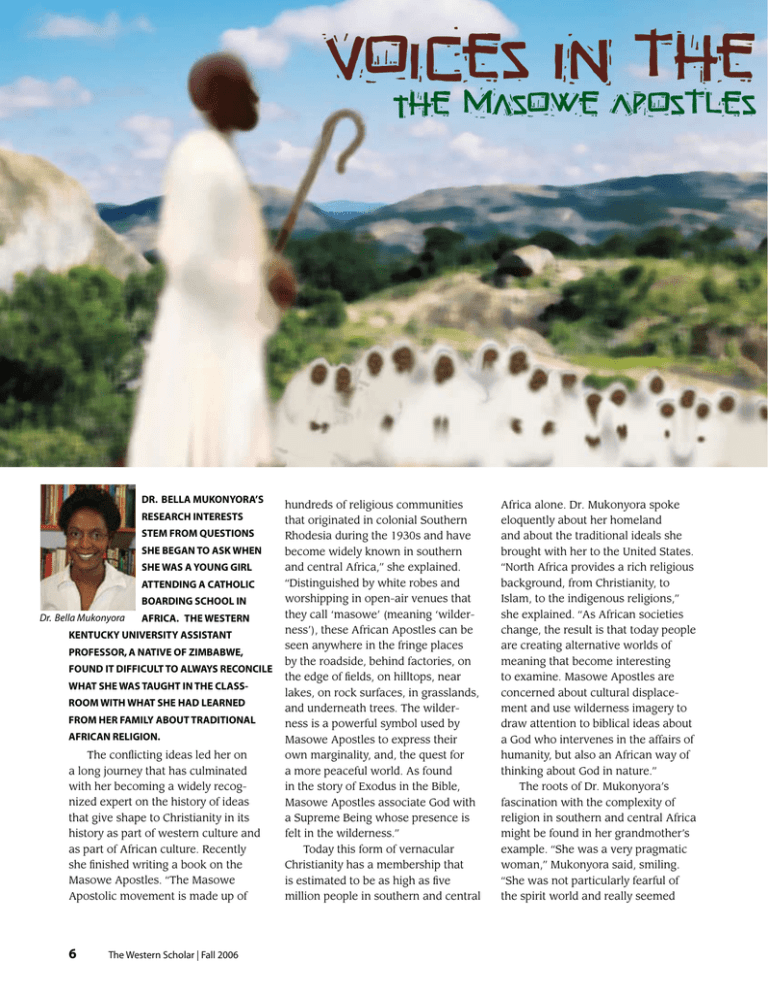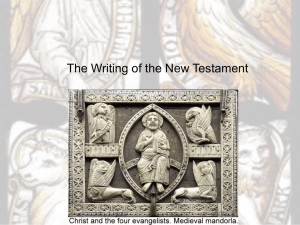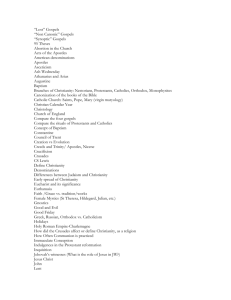Voices in the The Masowe Apostles
advertisement

Voices in the The Masowe Apostles Dr. Bella Mukonyora’s research interests stem from questions she began to ask when she was a young girl attending a Catholic boarding school in Dr. Bella Mukonyora Africa. The Western Kentucky University assistant professor, a native of Zimbabwe, found it difficult to always reconcile what she was taught in the classroom with what she had learned from her family about traditional African religion. The conflicting ideas led her on a long journey that has culminated with her becoming a widely recognized expert on the history of ideas that give shape to Christianity in its history as part of western culture and as part of African culture. Recently she finished writing a book on the Masowe Apostles. “The Masowe Apostolic movement is made up of The Western Scholar | Fall 2006 hundreds of religious communities that originated in colonial Southern Rhodesia during the 1930s and have become widely known in southern and central Africa,” she explained. “Distinguished by white robes and worshipping in open-air venues that they call ‘masowe’ (meaning ‘wilderness’), these African Apostles can be seen anywhere in the fringe places by the roadside, behind factories, on the edge of fields, on hilltops, near lakes, on rock surfaces, in grasslands, and underneath trees. The wilderness is a powerful symbol used by Masowe Apostles to express their own marginality, and, the quest for a more peaceful world. As found in the story of Exodus in the Bible, Masowe Apostles associate God with a Supreme Being whose presence is felt in the wilderness.” Today this form of vernacular Christianity has a membership that is estimated to be as high as five million people in southern and central Africa alone. Dr. Mukonyora spoke eloquently about her homeland and about the traditional ideals she brought with her to the United States. “North Africa provides a rich religious background, from Christianity, to Islam, to the indigenous religions,” she explained. “As African societies change, the result is that today people are creating alternative worlds of meaning that become interesting to examine. Masowe Apostles are concerned about cultural displacement and use wilderness imagery to draw attention to biblical ideas about a God who intervenes in the affairs of humanity, but also an African way of thinking about God in nature.” The roots of Dr. Mukonyora’s fascination with the complexity of religion in southern and central Africa might be found in her grandmother’s example. “She was a very pragmatic woman,” Mukonyora said, smiling. “She was not particularly fearful of the spirit world and really seemed Wilderness Religion of Africa Photos courtesy of J. Nathan Corbitt Photo illustrations by Tom Meacham BY CAROL CUMMINGS Flag of Zimbabwe to take God for granted. However, in times of difficulty her religious side surfaced. As if conversing with a friend, she would ask Mwari (God) what was wrong, and, sometimes call upon the lineage ancestors to remind them of their duty to protect her and the children of the lineage. Otherwise, this woman exercised her knowledge about farming to meet the day to day needs of the family and used folk stories to speak at length about knowing what is good and bad in the world. She was religious in a very different way.” As a girl growing up in a Catholic boarding school in Mashonaland, Zimbabwe, Mukonyora was taught about Christian beliefs and morals of a western cultural variety. “I also had extended family members who practiced indigenous religion, which demanded more attention on the part of adults than children. This raised many questions in my mind,” she said. “After I got married and found myself accompanying my Methodist husband to Protestant Churches — the picture of Christianity became quite complicated for me. I had grown up with enough questions of my own. Now I saw the need to study religion for myself.” In her studies she learned about the origins of Christianity and the development of a subject called Theology around questions of the meaning of God. This created an ever deeper quest for knowledge about the way Africans interpreted Christianity. So, Dr Mukonyora turned to the Masowe Apostles. Her fascination with them came from the fact that they reflect more of Africa today than the past. “They address questions that are important in Africa today — questions in the context of societal change, poverty, and AIDS,” she explained. “It is a religious movement designed to motivate and inspire. It is about self-integrity in conditions of marginality in a society that is changing. Masowe Apostles offer a blend of traditional religious ideas and practical questions, shaping the responses to challenges placed on people by Christianity in a post-colonial world.” The Masowe Apostles grew from the teachings of Johane Masowe. Johane was born in 1914 and grew up under the family name Shonhiwa M’Tunyane, or Masedza, in an Western Kentucky University The Masowe Apostles in Zimbabwe during a laying on of hands healing after a worship service (1989) The Western Scholar | Fall 2006 Johane Masowe (photo source unknown) African village called Gandanzara in Zimbabwe. A menial laborer, he had to stop work due to chronic headaches that caused him to sleep excessively and have dreams about death. He believed that God could heal him, so he started to preach the gospel during the 1930s, leading some of his followers from his native Zimbabwe to Botswana, South Africa, Zambia, Tanzania, and Kenya. “This journey has been described as an exodus for African people on a quest for a promised land,” Dr. Mukonyora wrote. “Johane’s claim to authority began with experiences of marginality. He suffered from acute pain and nightmares about death, and, in other stories, was a victim of colonial oppression and violent abuse. Moreover his dreams were also filled with the ‘voice’ of God in places he called ‘masowe’ (wilderness) to draw attention to the biblical prophetic tradition of voices crying in the wilderness that saints embrace in wider Christian tradition.” At the time of his death in 1973, stated Dr. Mukonyora, Johane Masowe left an estimated following of more than half a million people in nine countries of east, central, and southern African. This number has grown exponentially, as there is now a whole new generation of people who were born members of the community, and the movement continues to attract new members as well. In her writings Mukonyora suggests that Johane Masowe is best understood as he himself stated: as a prophet whose role model was John the Baptist. Many have misunderstood and believed that Masowe’s followers see him as a Christ, but Dr. Mukonyora says this is not the case. “He portrayed himself as a prophet among the Shona people,” Dr. Mukonyora wrote. Perhaps the most interesting feature of Masowe Apostles is that women are the main ceremonial leaders. While the men insist on preaching, women exercise “certain important mystical powers and spiritual gifts that are exercised during healing ceremonies that attract new members to the movement.” The Apostles hold the wilderness and all of Earth as sacred when it comes to their venues of prayer. In African cultures where women are the ones often found wandering the fringes of the landscape in search of water, food, and other treasures of Earth, it is not a surprise that women are also attracted to a religious movement that takes so many of its symbols from the world as women experience it, according to Mukonyora. Since coming to WKU in 2005, Dr. Mukonyora has introduced courses on Women in Religion, and Christianity in Africa. She also teaches courses on Christian history and thought, and is writing a book about gender landscapes in Masowe spirituality. Her road to WKU is as colorful as the road she took in finding her own place in religion. She received a Diploma in Higher Education at Trinity College in Bristol, which was followed by a Bachelor of Arts Degree in Theology from London Bible College. After a year of working as an administrative assistant for the Church Missionary Society in Waterloo, London, she decided to study for a Master of Letters degree in the History of Religions at the University of Aberdeen, Scotland. Upon her graduation in 1989, she returned to Africa and began research on African Initiated Churches and was awarded a British Commonwealth Scholarship in 1992. She then returned to England as a member of St. Antony’s College and student of the Faculty of Theology at the University of Oxford, where she graduated with a Doctor of Philosophy Degree in 1998. She had academic appointments at the University of Zimbabwe and the University of Virginia before coming to Bowling Green, Kentucky, where she now serves as an assistant professor in the Department of Philosophy and Religion at WKU. “Today people in the humanities tend to think religion is not important to study,” she mused. “It is important in Africa where Christianity has become a major religion, and in a wider society heavily influenced by values derived from Christianity. African-initiated Churches such as the Masowe Apostles offer independent ways to address the difficulties people face far away from here. Masowe Apostles are neither African traditional nor trying to follow the European missionary teaching, but innovative in their use of language as a tool for expressing truths.” Dr. Mukonyora experiences many challenges in answering the western world’s questions that define for her what she should look for in religion and what she should teach. These challenges provide a sharp parallel with the conflict she experienced those many years ago in boarding school when she searched for her own sense of place between indigenous religion in Africa and the western style of Christianity. “I suspect that the answer is somewhere in between,” she concluded. n Western Kentucky University




